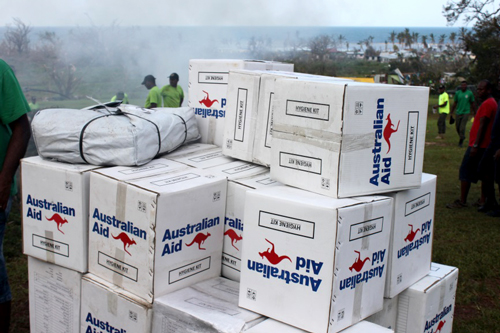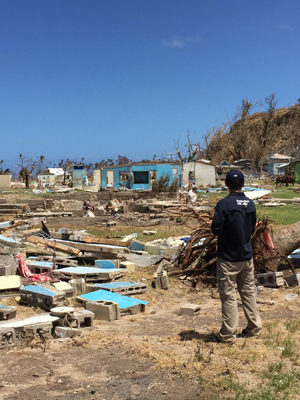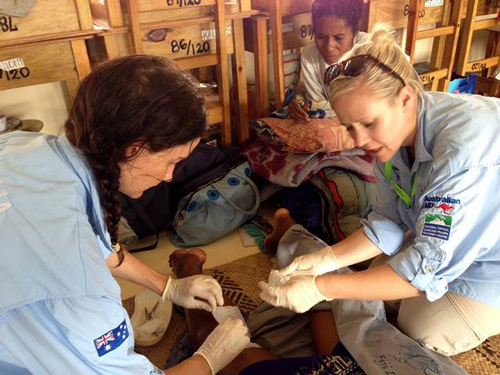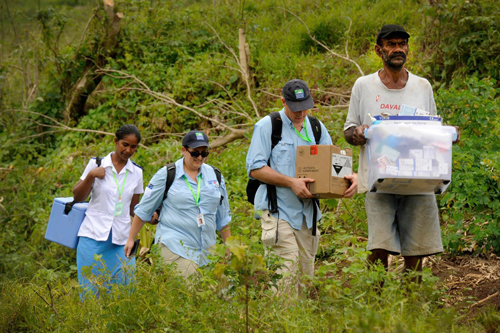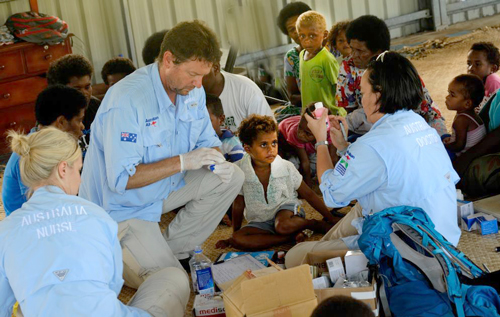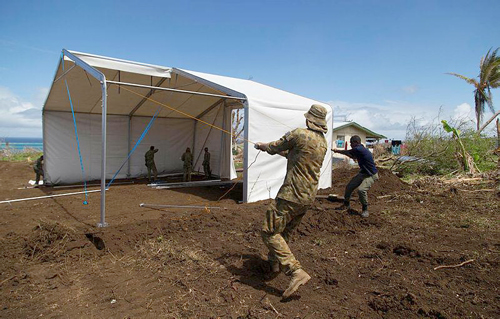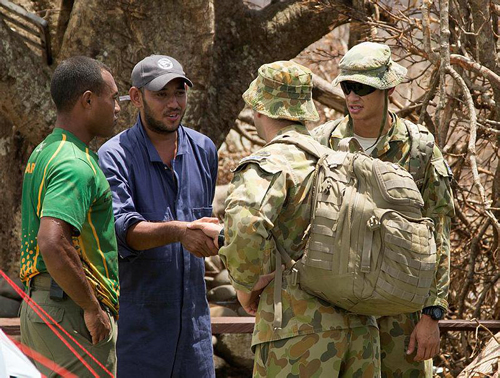Immediate support to Fiji
In 2016, the Australian Government worked closely with the Fiji Government to provide immediate assistance to over 200,000 men, women and children. This included relief supplies such as shelter, water, food, and hygiene items, and access to education and emergency health care.
This support was complemented by emergency grants through Australia's existing bilateral program partners. These grants supported activities such as school feeding programs to encourage children to go back to school and supplied vegetable seeds to over 26,000 people to complement other foods sources.
Video: Australia's humanitarian support to Fiji after Tropical Cyclone Winston
Infographic: Australia's response to help Fiji recover from Tropical Cyclone Winston
Support for children
The cyclone damaged or destroyed almost 500 schools. Australia responded by helping the Fiji Government to assist children get back to school as quickly as possible.
Australia worked with Fiji's Ministry of Education, UNICEF and Save the Children to:
- create temporary learning spaces for almost 15,000 children;
- provide a school feeding programs for almost 10,000 children;
- provide educational materials for over 50,000 children;
- restore water and sanitation facilities in schools; and
- provide psychological support to teachers and children.
Health care
Australia worked with Fiji's Ministry of Health and Medical Services to ensure that essential health services reached affected communities. Australia deployed a 21-person Australian Medical Assistance Team to Fiji that provided emergency health care to over 1,700 people in rural and remote communities. Australia helped establish temporary health care facilities in areas where clinics were destroyed, and helped re-establish cold-chain vaccination storage facilities that enabled important vaccines to reach affected communities.
Protecting the vulnerable
Protecting the rights and dignity of people affected by a crisis is an essential component of Australia's humanitarian work. Australian-funded clean delivery kits, which enable health facilities to safely deliver babies even when clean water and electricity is unavailable, were distributed in Fiji within 48 hours of the disaster.
Australia, through partners United Nations Population Fund (UNFPA), International Planned Parenthood Federation (IPPF) and Medical Services Pacific, distributed reproductive health kits, 4,000 dignity kits and helped health outreach teams provide services to pregnant and breastfeeding women. Australia supported the establishment of the "Women Friendly Spaces" initiative, which helped women access information and services related to gender-based violence, health care and psychological support. This helped almost 2,000 women and girls in the three months following the cyclone.
Australia also assisted in topping up the Fiji Government's social protection payments to help ensure 72,000 people dependent on social welfare could buy food. To assist people with disabilities affected by Tropical Cyclone Winston, Australia helped the Spinal Injuries Association undertake a needs assessment, replace or repair assistive devices damaged or lost due to the cyclone and provide much-needed consumables.
Australian deployments to Fiji
Australian Government officials
Australian Government personnel were deployed to help within two days of Tropical Cyclone Winston. About 60 members of DFAT's Crisis Response Team were sent to Fiji and DFAT activated its Crisis Centre in Canberra.
Two Australian Civilian Corps specialists also worked alongside experts in Fiji's National Disaster Management Office to help manage response efforts.
Medical Assistance Team
The 21-person Australian Medical Assistance Team (AUSMAT) was in Fiji for over three weeks, providing rural and remote medical outreach. The team provided much-needed care for more than 1,700 people in Rakiraki, Ovalau, Ba, Korovou and surrounding villages.
Operation Fiji Assist
The Australian Defence Force (ADF) provided extensive support to Australia's humanitarian activities through Operation Fiji Assist. ADF support included:
- deploying approximately 1000 personnel to Fiji;
- aerial assessments by surveillance aircraft;
- seven MRH-90 helicopters to assist with response efforts and deliver humanitarian; stores; and
- C-17 and C-130 flights that delivered over 520 tonnes of humanitarian supplies and equipment.
The ADF's HMAS Canberra was also deployed to Fiji loaded with engineering assets, helicopters, water purification equipment and humanitarian supplies. It was positioned off Koro Island, where ADF engineers helped to repair schools, medical centres and infrastructure.
The ADF formally concluded its mission on 19 April 2016, coinciding with the end of the Fiji Government's State of Natural Disaster.
Energy sector partnership
Tropical Cyclone Winston damaged more than 4,500 power poles and affected up to 90 per cent of Fiji's power network. Following a request from the Fiji Government, the Australian Government partnered with the peak body of the Australian energy industry, Energy Networks Australia, to increase the speed of restoration work to Fiji's power network by an estimated 25 per cent.
Australia's energy sector has provided supplies and vehicles [PDF 140 KB] including three crane borers, three elevated work platforms and a service truck to Fiji. This equipment is valued at $10 million.
Evaluation of Tropical Cyclone Winston education response
This evaluation assessed whether Australia's humanitarian response in the education sector following Tropical Cyclone Winston was relevant, timely, effective and appropriate.
Evaluation of education response
Media releases
- Additional support for Fiji
20 April 2016 - HMAS Canberra returns from Fiji
30 March 2016 - Australian support for Fiji continues
25 March 2016 - Visit to Fiji
12 March 2016 - Additional humanitarian support to Fiji
29 February 2016 - Australian support to Fiji expands
27 February 2016 - Relief reaches those in need in Fiji following Tropical Cyclone Winston
23 February 2016 - Australian aircraft to provide assistance to Fiji
23 February 2016 - Response to Tropical Cyclone Winston
22 February 2016

